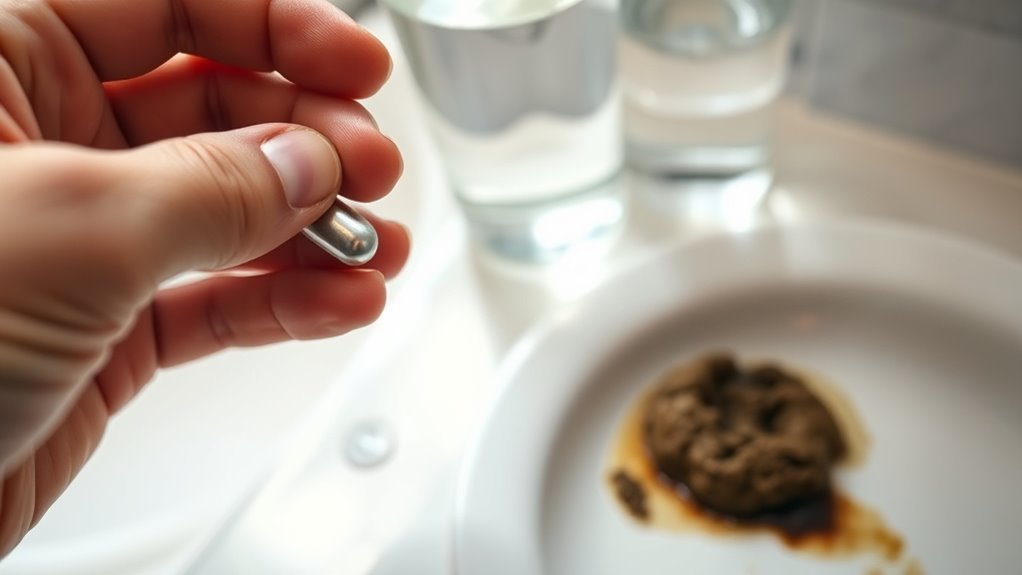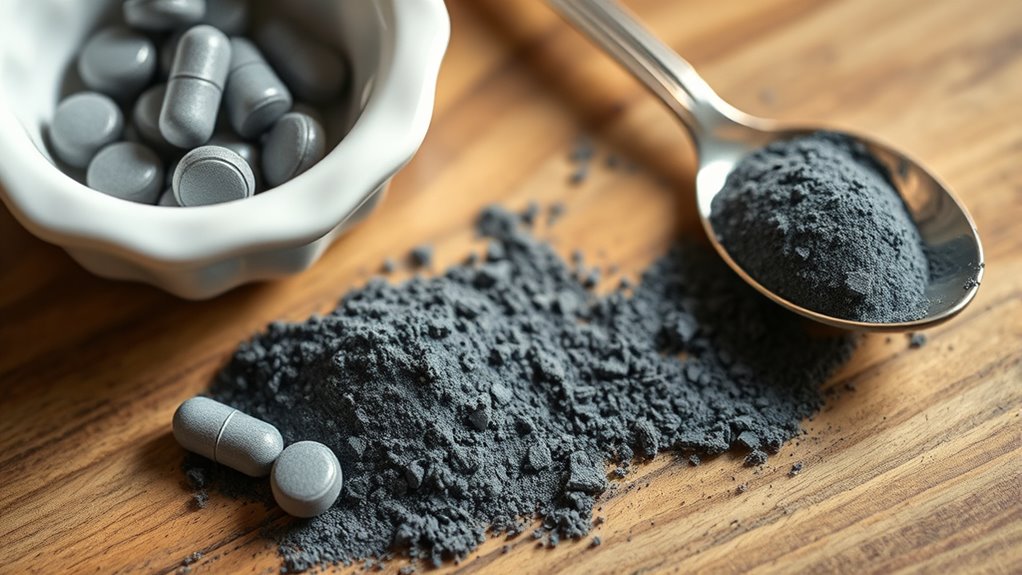When I took iron supplements, I noticed my stool darkened to black, which is normal and caused by iron reacting in my gut. It sometimes had a stronger odor, and I experienced a bit of stomach upset or constipation. To manage side effects, I increased fiber and stayed hydrated. If you’re curious about how these changes might look or feel for you, keep going to find out more about these common effects.
Key Takeaways
- Iron supplements often darken stool to black or tar-like, which is a harmless side effect caused by iron reacting in the digestive system.
- They can cause stronger or unpleasant stool odors due to iron interacting with gut bacteria and food residues.
- Gastrointestinal side effects like constipation, nausea, or stomach cramps are common but manageable with diet and hydration.
- Taking iron with food may reduce stomach discomfort but can decrease absorption; adjusting dosage or formulation can help.
- Persistent or severe symptoms should be discussed with a healthcare provider to ensure safe and effective iron supplement use.

If you’ve started taking iron supplements, you might notice changes in your stool, which can be concerning or confusing. It’s a common experience, and understanding the gastrointestinal effects of these supplements can help ease your worries. Iron supplements are known to cause noticeable changes in stool color, often turning it a darker shade—sometimes black or very dark brown. This is usually harmless and simply a result of the iron reacting with substances in your digestive system. However, it can be alarming if you’re not expecting it, especially if you notice your stool has a tar-like appearance.
Iron supplements can darken stool, which is usually harmless but may seem alarming.
Apart from color changes, iron supplements can also influence the smell of your stool. Many people report a stronger, sometimes unpleasant odor after starting iron therapy. This is due to the iron interacting with gut bacteria and food residues, producing different byproducts. While the change in smell isn’t typically a sign of infection or illness, it can be unsettling. Some might also notice a metallic taste in their mouth or a slight aftertaste, which is another gastrointestinal effect of iron intake.
It’s important to recognize that these changes in stool are normal side effects of iron supplements, but they can also lead to other gastrointestinal discomforts. Many users experience constipation or, less commonly, diarrhea. Iron can slow down intestinal motility, making bowel movements less frequent and sometimes harder to pass. This can be frustrating, especially if you’re already dealing with other digestive sensitivities. To mitigate constipation, healthcare providers often recommend increasing fiber intake, staying well-hydrated, and sometimes using stool softeners if necessary.
Some individuals might experience stomach upset, nausea, or cramps after taking iron supplements. These gastrointestinal effects can vary depending on the form of iron used and individual sensitivity. Taking iron with food can sometimes lessen stomach discomfort, but it may also reduce absorption, so it’s a balancing act. If you notice persistent gastrointestinal symptoms or if the side effects become severe, it’s a good idea to consult your healthcare provider. They might suggest switching to a different type of iron supplement or adjusting the dosage. Additionally, the presence of certain HEPA filtration features in some supplements can help reduce airborne irritants that might worsen gastrointestinal discomfort in sensitive individuals.
Frequently Asked Questions
Can Iron Supplements Cause Constipation or Diarrhea?
Yes, iron supplements can cause constipation or diarrhea. They often impact iron absorption and may lead to changes in stool pigmentation, such as darkening. Some people experience constipation due to iron’s effects on the digestive system, while others might have diarrhea. It’s important to monitor your symptoms and stay hydrated. If side effects persist, consult your healthcare provider to adjust your supplement or explore alternatives to support your iron levels comfortably.
Are There Natural Alternatives to Iron Supplements for Anemia?
They say, “You are what you eat,” and I believe natural options can truly help with anemia. I’ve found plant-based sources like spinach, lentils, and quinoa rich in iron. Herbal remedies like nettle tea and ginger can also boost iron absorption. While these alternatives work for some, I always recommend consulting a healthcare professional to tailor the best approach for your needs.
How Long Does It Take for Stool Color to Normalize After Stopping Iron?
Stool color changes from iron supplements usually normalize within a few days after stopping them. It typically takes about 2 to 3 days for the effects of iron supplement effects on stool color to fade, but it can sometimes take up to a week. If your stool color doesn’t return to normal or you notice other symptoms, I recommend consulting your doctor to rule out other issues.
Do Iron Supplements Interact With Other Medications or Foods?
Yes, iron supplements can have drug interactions and dietary considerations. I always tell people to be cautious, as certain medications like antibiotics or antacids can reduce iron absorption. Also, foods rich in calcium or polyphenols, such as dairy or tea, can interfere with iron uptake. To avoid issues, I recommend taking iron supplements on an empty stomach or as directed, and discussing all medications and diet with your healthcare provider.
What Are the Signs of Iron Overdose or Poisoning?
If you suspect an iron overdose or poisoning, look out for symptoms like severe stomach pain, vomiting, diarrhea, weakness, and confusion. Iron overdose can escalate quickly, leading to serious health issues like organ damage. Recognizing poisoning symptoms early helps you act fast—seek emergency care immediately if these signs appear. Remember, taking too much iron isn’t just risky; it can be life-threatening. Stay cautious and consult your doctor about safe dosage.
Conclusion
In wrapping up, I want you to remember that iron supplements can alter stools, causing color changes, distinctive smells, and sometimes side effects. Staying vigilant helps you spot symptoms early and stay safe. So, be aware, be alert, and don’t hesitate to discuss any concerns with your healthcare provider. By paying attention and practicing precaution, you’ll navigate iron supplementation smoothly, safeguarding your health while supporting your strength and stamina.








